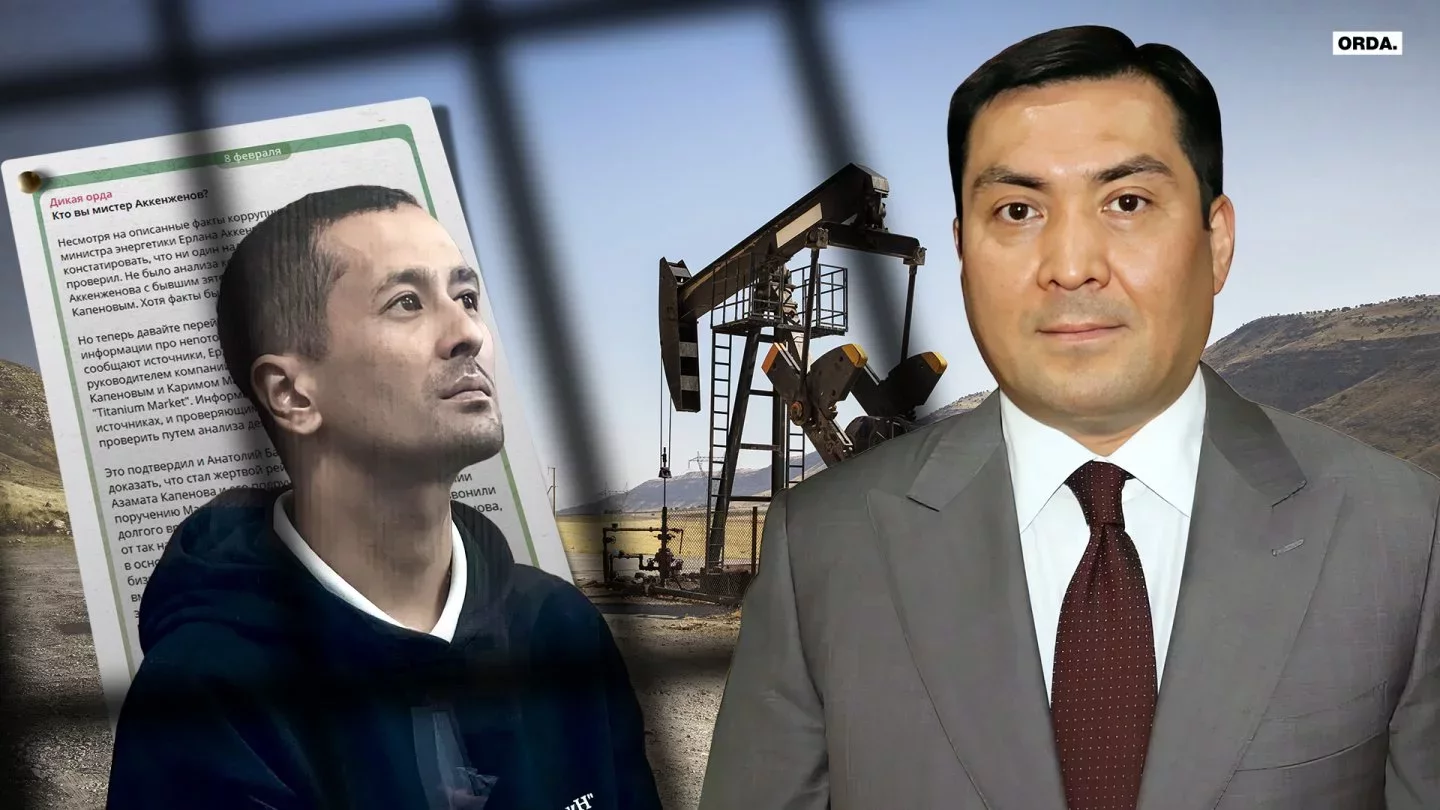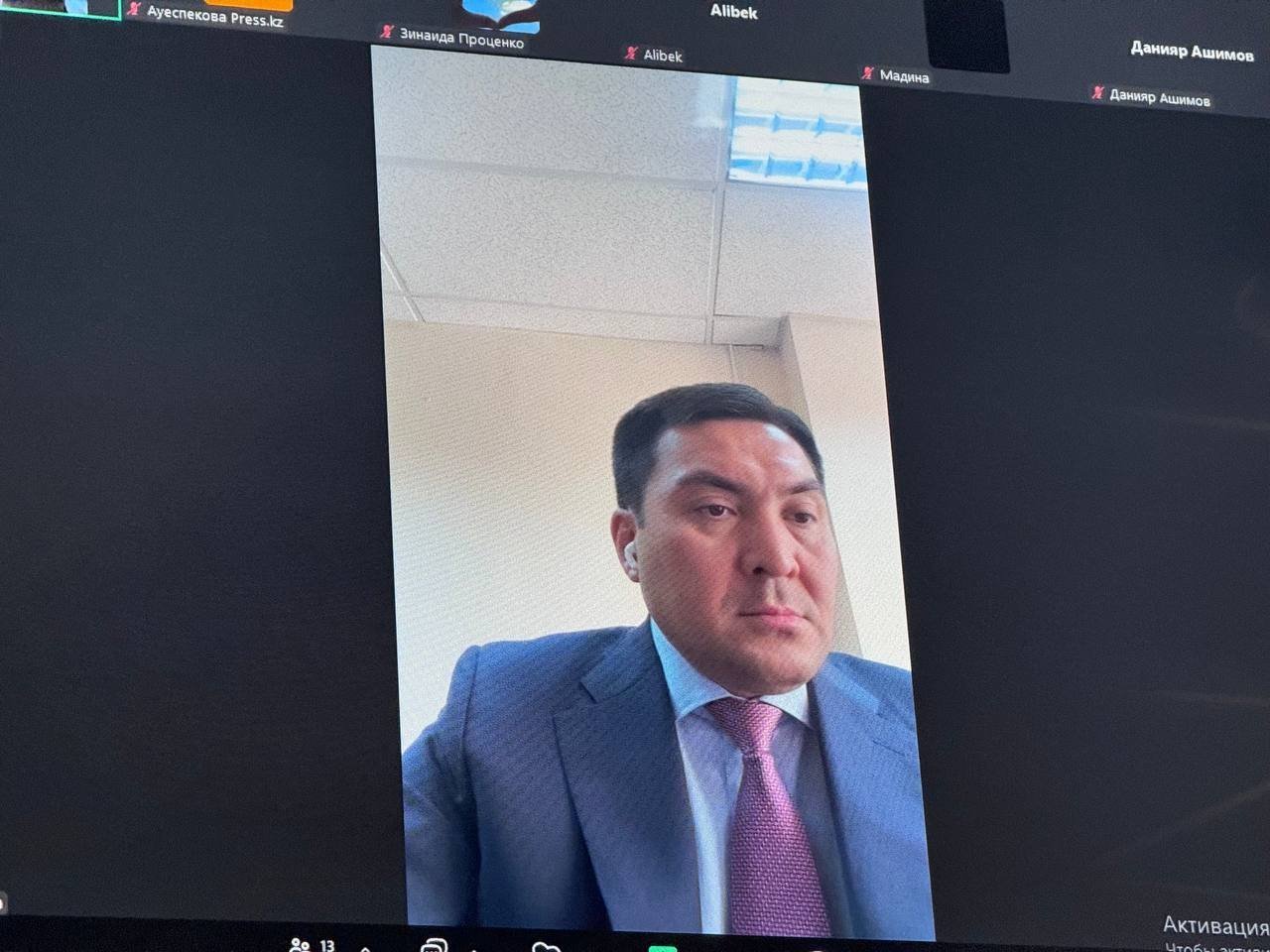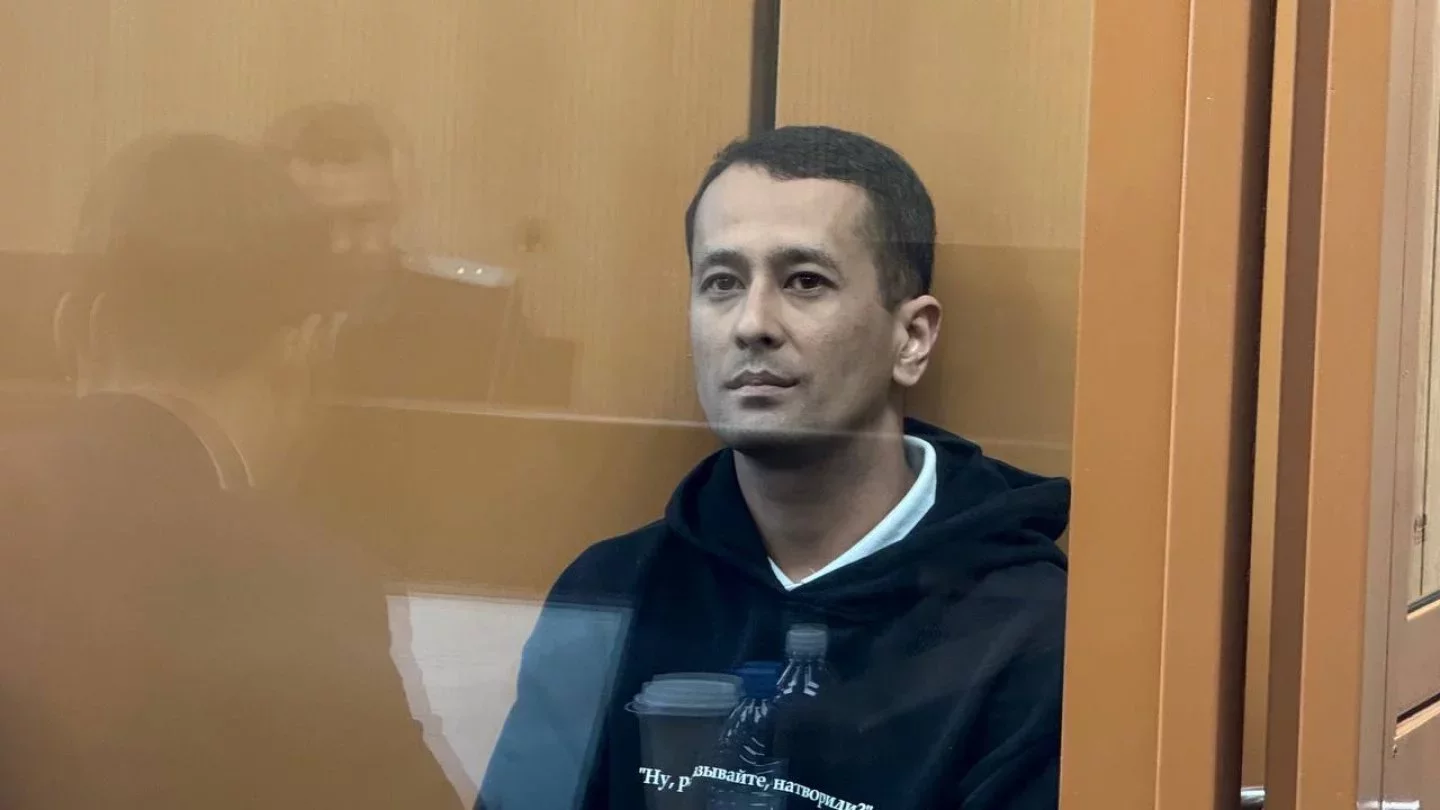Vice Minister of Energy Akkenzhenov: “Nothing Adilbekov Wrote about Me Was Confirmed”

A court sentenced the author of the Telegram channel "Dikaya Orda" Daniyar Adilbekov. Adilbekov received four and a half years in prison. He was found guilty of false denunciation and dissemination of knowingly false information.
Three people filed statements with the police regarding the channel's publications: journalist Gulzhan Yergaliyeva, investor and director of the capital's airport Yusuf Rashed Aljauder, and Vice Minister of Energy Yerlan Akkenzhenov.
A month ago, during the trial, our editorial staff reached out to Yerlan Akkenzhenov for an interview. Citing a busy schedule, the Vice Minister of Energy agreed to answer Orda.kz's questions only in writing. He provided his answers for publication after the court's verdict.
The Adilbekov Case
Daniyar Adilbekov, the author of the telegram channel "Dikaya Orda," was convicted. Why did you decide to file a statement with the police?
— I decided to file a complaint against the anonymous Telegram channel when I read the second publication of “Dikaya Orda” forwarded to me. I contacted lawyers and said something had to be done to stop the flow of false and unreliable information about me. They wrote a statement on my behalf via eOtinish and submitted it to the Astana City Police Department. We documented all the publications through a notary, literally collected evidence, took all the screenshots and photocopies with a link, printed them out, and then authenticated them, as required by law. In general, we did everything so that all the evidence could be included in the case. I, like any other citizen of Kazakhstan, have every right to defend my name, especially when some information attacks are made against me that have no factual basis.
What is false about the information published on the Dikaya Orda channel?
— Let's at least remember that the central message of the publications was that I am connected or somehow affiliated with Karim Massimov. But I have never even seen him in person in my life! It's a fact, I have never met him, had no mutual areas or any mutual affairs with him. I confirmed this in court under oath. At this point, the whole point of the post in "Dikaya Orda" falls apart. But we can go further.
The post said that I allegedly monetized my position; that is, I was accused of corruption, called a corrupt official, and allegedly took money in exchange for lobbying interests. This is not true. My position simply cannot be monetized, as the ministry is a government body in the energy sector of Kazakhstan, we implement policy in this area based on the adopted laws. This is not a commercial structure; we do not trade anything and certainly do not make decisions regarding the purchase and sale of oil, the appointment of contractors, and so on. We have never interfered in anyone's business relations, and this is reality.
But even Energy Minister Almasadam Satkaliyev acknowledged the problems in oil distribution within the country, stating that there is a human factor involved...
— I fully agree with the minister. The human factor is present here, as in any other socio-economic sphere. Just when I was appointed to the post of vice-minister, one of my main tasks was to reduce the influence of this very human factor. It is clear that the human factor is conditioned not only by external factors but also by the lack of qualifications or the slow technologization of processes. These are, at the very least, factors that restrain growth.

That is why I am engaged in implementing advanced technologies to digitalize all processes related to oil distribution within the country and for export. I am personally responsible for these processes before the country's leadership. It is important to remember that energy security is an essential aspect of national security in general; the events of recent years have clearly shown us how the energy sector and issues related to energy resources directly affect the economic, political, and social stability of a country.
If we talk about the issues concerning the existence of a monopoly in the domestic oil refining sector, I will say this: currently, there are three oil refineries operating in the country - the Atyrau Oil Refinery, the Pavlodar Petrochemical Plant and the Shymkent Oil Refinery. Our Chinese partners own half of the Shymkent refinery; the other two belong to JSC NC KazMunayGas. These are strategic facilities, the operation of such extensive and essential facilities ensures energy stability for our country, and supply interruptions can lead to economic crises. Therefore, it is clear that these plants are state-owned.
I will also note that the Agency for the Protection and Development of Competition had a question about the regulations for access to crucial capacity. Today, these regulations are being developed, and the mechanism will be implemented soon. Although, if you look at the turnover of individual oil products, this is already spelled out there. Within three days, each plant actually concludes an agreement on oil processing. Therefore, I do not think that there are any significant problems here at all.
The Agency for the Protection and Development of Competition also acknowledged the existence of a monopoly in the oil refining sector. There was a letter from oil companies to Toqayev, who complained about the Ministry of Energy. What evidence of the falsity of Adilbekov's information did you present in court to restore your reputation?
— The investigation itself established that there was a client for these articles, all the supporting materials that he ordered these articles and paid money for them, all the translations, photographs, screenshots of the translations — the entire body of evidence that the publications were ordered, the investigation confirmed. The fact that Adilbekov received money was established. This is the critical point. Moreover, I understand the motive for these publications. They simply tried to put pressure on me so that I would allow them to do certain things that contradict my personal beliefs, professional ethics, and, most importantly, the interests of our country.
Did you know that Daniyar Adilbekov is the author, and were you familiar with him before this situation?
— Honestly, I didn’t even know about Daniyar Adilbekov’s existence. It was only later that I was told that he was the editor-in-chief of Press.kz. One thing was important to me – that the distributor of false information was simply found, and I could defend myself legally. To be honest, I still wonder why Adilbekov, as the editor-in-chief of the publication, didn’t publish those articles in his media outlet. Then, I would have had the opportunity to resolve this issue with him civilly, prove him wrong, and counter all the accusations. But no, the man decided to hide behind an anonymous channel and publish those posts there.

This only means the information was unverified, and no journalist or official media outlet would be held responsible for it. That is why the articles are published anonymously. Moreover, in my opinion, such posts are not published out of some burning journalistic duty; it is simpler - they take money for publishing materials on such channels. The essence of many anonymous Telegram channels is precisely that some people hidden behind the screen have such a tool of pressure not only on civil servants but also on other people - entrepreneurs, public figures, activists ... If any articles discrediting the honor of other people were published on the pages of officially registered media, then it would be possible to defend yourself by legal methods publicly. But this way, you can write unverified things in a barrage, and who will find you later since you are anonymous? Fortunately, in our case, law enforcement officers found the author of the articles.
How did you participate in the investigation, how many times were you questioned? Why do you think the KNB got involved in the investigation?
— I was involved in investigative actions several times. I think I gave testimony four times. I spoke with one investigator; he was an employee of the Ministry of Internal Affairs. No KNB officers contacted me.
You and journalist Gulzhan Yergaliyeva, the second affected person, have the same legal representative. How did this happen? There are many qualified and licensed lawyers in Kazakhstan.
— Incidentally, as soon as the criminal case was opened, I had another lawyer. Due to family matters, she was unable to continue working with me. When I was summoned to the Ministry of Internal Affairs, and I gave statements, the lawyer currently working with me was there. There, I asked him. I needed to make decisions urgently; there was a lot of work and little time, so we agreed he would be my representative. We signed an agreement with him, and from that moment on, he represented my interests in court, that's all.
The journalist was convicted of false denunciation, this article implies that after the defendant's actions there should have been legal consequences for the affected person. What consequences did you have after the publications were published? Did law enforcement agencies investigate you?
— Well, about the checks. There truly was a check, and the results of this check were unverified; that is, nothing that Adilbekov wrote about me was confirmed. Moreover, I myself contacted Antikor with a statement asking if there were any cases against me. The corresponding answer is also contained in the criminal case, and it is in the negative. Here, we are talking about my reputation, not just as a person and a citizen, which, of course, is very important. The issue is much broader — we are talking about my reputation as a civil servant because reputation here affects people's trust in the authorities as a whole. I had to defend myself by any available legal means. Then, about the classification of the case and other issues — to be honest, this is not really my business. After all, the decision on how to classify the case was not made by me but by the Ministry of Internal Affairs, the pre-trial investigation bodies. I just wanted to seek justice.
The Oil Business
At one court hearing, Adilbekov's lawyer presented your "influential connections" in the oil business. In particular, he presented evidence that you own an oil business while holding a political position. Namely, you are the sole founder of TOO "BITUM MARKET," which sells gasoline. You indicated that this TOO was sold due to illiquidity, although the amount of tax liabilities alone exceeds 98 million tenge. How would you comment on this?
We are now again discussing untrue information. This company has never sold gasoline, not a single ton. I did not say that I sold it because of its illiquidity; this is also false information. The company's activities have been suspended since 2022, from the moment I began working at JSC NC KazMunayGas, and to this day, the company is not operating.
There was also a statement that you have a close connection with Karim Masimov's former in-law, Azamat Kapenov. This is evidenced by your name appearing in private companies associated with his mother. Do you have any connections with Azamat Kapenov?
— I know Azamat Kapenov, yes, but we stopped communicating back in 2019, and since then, I have never maintained any contacts or connections with him.
Tell us how you became Vice Minister of Energy. Did you put forward your candidacy, or did someone recommend you?
— There is a specific procedure, I went through it for several months, but according to this procedure, the minister nominates a candidate for the position of vice minister.
How do you personally assess the transparency and efficiency of Kazakhstan's oil and oil products market?
— I would like to note again that my main task is precisely to increase transparency, and I believe that this can be achieved by digitalizing our entire industry. Digitalization increases transparency because it makes information accessible and easily verifiable, which reduces the opportunities for corruption and other abuses. In general, digitalization and technologization of the industry will certainly give impetus to further development. Moreover, the President signed a decree on the liberalization of the economy, and I believe this decree will play a double positive role in our country's oil industry.
Have you seen the recent Azattyq investigation about oil company employees' real estate in Dubai? Do you think these are honest, fairly earned billions, while workers' strikes constantly rock the oil industry?
— I will be honest, I have not watched this investigation, so I find it difficult to comment on this matter since I am not immersed in the subject of the conversation. Regarding the strikes, I want to say that not a single such case has ever been and will not be overlooked by the state. We react to each case without exception.
Fuel Shortage
The situation with automobile fuel consumption is becoming more complicated in Kazakhstan. Some believe the consumption growth is due to the country's export of fuel and lubricants. In addition, the Atyrau Oil Refinery is under repair. What is being done to prevent a shortage in the long term?
— Firstly, exporting fuel (92, 95 petrol, diesel fuel) is prohibited, and the so-called cover goods for which they can be exported are also prohibited. We periodically extend the ban.
More precisely, every six months. The ban order was introduced a little over two years ago, so the ban is in effect here. Regarding the country's deficit, at the moment there are no indicators of a diesel fuel deficit. There are minor difficulties with 92 petrol, but we will solve them. If we talk about the repair of factories, then you understand that a factory is a technologically complex structure, an entire ecosystem that requires specific maintenance and repair.
Currently, each plant operates at almost one hundred percent of its design capacity. It's like driving a car with red signals, constantly straining the engine. We are also currently operating plants. Therefore, it is necessary to service them in a timely manner, to do scheduled repairs. This year, the Atyrau Oil Refinery was stopped from October 1 to October 25, so we have the situation under control.
What are the reasons for the refinery repairs, why are the works taking so long, and what should be the result of the repairs? Are there plans to build new refineries? What percentage of the oil and gas produced does Kazakhstan process independently?
— Today, the Ministry of Energy has prepared a concept for developing the oil refining industry until 2050. We have been discussing it for quite a long time. About twelve discussion sessions were held. About 300 comments were received.
Discussions are being conducted in a broad format. We have involved all associations, all organizations related to oil refining in the discussion here. Literally, every person who wants to make a contribution can take part in the discussion of this concept.
Now, according to our concept, the issue is to build a fourth oil refinery with a capacity of up to 10 million tons by 2030. If we talk about expansion projects, then at the moment we have planned to double the Shymkent Oil Refinery — from six to 12 million tons. We also want to expand Pavlodar from six to eight million tons and eliminate bottlenecks at the Atyrau plant to allow processing there to increase from six to plus one million tons due to secondary processing processes.
We plan to complete these projects by 2030. Therefore, I believe that the work in this area is being done correctly. All our plants are already producing or will produce fuel of the highest environmental standards. Moreover, we do not plan to reduce jobs; on the contrary, the number of jobs will increase at the time of modernization.
Accordingly, if plant capacity increases, it is clear that maintenance personnel will also increase; these will be permanent jobs. The result of all this work will be a reduction in repair times.
For example, we now have repairs yearly; we are reducing the period between repairs from one year to three years. Next year, we plan to transfer the Shymkent Oil Refinery to a three-year period between repairs. Each of our plants awaits this. That is, if now they stop once a year, then starting next year, they will stop once every three years. This will increase the quality of the repair work, and the volume of output, and the quality of the output, respectively.
Original Author: Vasily Masalsky
The original article was published on 23/10/2024. For accuracy, please refer to it.
Latest news
- Thermal Power Plant Projects: Kazakhstan Looking for Alternatives for Russian Contractors
- Shymkent Theater Officials Accused of Embezzling Over 136 Million Tenge
- Ashgabat Responds to Media Report on Internet Access
- Rare Glimpse: Red-Listed Lynx and Secretive Badgers Filmed in the Wild
- Kairat Forward Becomes Youngest Kazakhstani to Score in Champions League
- Orda's Editor-in-Chief Targeted in Questionable Ownership Maneuver
- Businessman Tried to "Push Through" Astana Boiler House Project with a Bribe
- Foreigners Coming to Uzbekistan for Work Will Be Required to Take an HIV Test
- Toqayev Appoints New Director to Reorganized Anti-Corruption Body
- Former Employees of Key Witness Testify in Sarbasov Trial
- Kazakhstan Plans to Launch Direct Flights to New York, Tokyo, and Singapore
- Kazakhstan Expects Minimal Impact from U.S. Tariffs, Trade Ministry Says
- Hemp to Be Cultivated in Northern Kazakhstan for Industrial Use
- Tajikistan and Kyrgyzstan Sign Series of Cooperation Agreements After High-Level Talks
- Vostokmashzavod Disputes Railcar Downtime Charges from KTZ-Freight
- Alik Aidarbayev Appointed General Director of Kalamkas-Khazar Operating
- Trump’s Tariff: Experts Weigh In on Kazakhstan’s Possible Response
- Kazakhstan Meat Cleared for European Market
- Journalist Lukpan Akhmedyarov Reports New Wave of Pressure
- Modernization of Syrym Checkpoint Promises Smoother Border Crossings, Orda.kz Talked with Drivers about Current Situation

